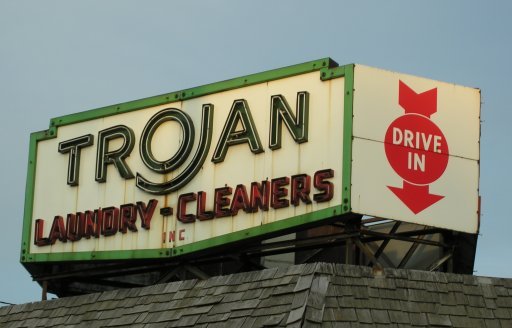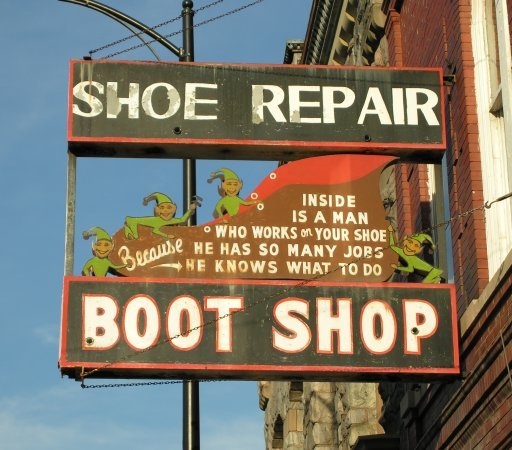Because I don't watch television or listen to commercial radio, I find I really detest outdoor advertising, particularly highway billboards. I wish we could go back to the days of Ladybird Johnson's highway beautification program, and look at wildflowers instead of an endless parade of ads, assaulting me, and interrupting my contemplation of the landscapes—I find myself able to gaze at farms for hours on end, especially, say, in the rolling hills of Wisconsin.
Perhaps the least egregious signs are those simply identifying the actual location of a business—though most of the modern versions—slick fluorescent boxes, painted canopies and the like—don't appeal to me much either.

I loved the light for these pictures: golden evening sun—perhaps because for me these signs and this light evoke Edward Hopper's wonderful paintings.
But, much as I detest modern american commercialism (represented in some height of bland ugliness by the strip of Southfield road just north of the freeway, populated by a seemingly limitless supply of anonymous, boxy commercial buildings with flat roofs, alternating with hideously proportioned Federalist motifs to signify conservative business values, as for banks, interspersed with dull strip malls at quarter mile intervals) even I find some signs appealing. (So far as the Southfield strip was concerned, my favorite, hands down, was one in arabic advertising a little travel agency—besides the exotic foreign language, it had a slightly handmade quality that appealed—but of course that business disappeared before the end of the first Iraq war...)
One was a wonderful old sign of a woman driving a car at a used car lot on 13mile road in Royal Oak; as I recall, her arm waved in neon. It's long gone. Here are two more of approximately the same vintage; a third, for Terry's Bakery, didn't quite make the cut, owing to its bland color scheme. But all evoke an era that ended before I was born, nostalgia for a bygone era when receipts were added by hand, and cash put in old-fashioned cash registers.

The wonderful thing about this little business is that the sign marks a still-thriving business—unusual for shoe repair in this day and age.
Idiosyncratic treasures like this tend to collect in pockets of ordinary neighborhoods, I think—certainly you'd never find anything such as these in the slick, wealthy Somerset Mall area with its perfectly manicured strips of annuals. Old, rusted, sometimes handmade signs are only to be found in somewhat poor places—struggling parts of Detroit, or Vietnam, or downtown Ypsilanti, poor cousin to wealthy Ann Arbor.
And, oddly enough, such places always seem to me more real—more comfortable—than the perfectly groomed Somerset Malls or Birmingham downtowns (our local wealthy enclaves).
pictures shot in late May and early June, coolpix 8400, evening. file created 13jun05
Unless otherwise noted, text, image and objects depicted therein copyright 1996--present sylvus tarn.
Sylvus Tarn